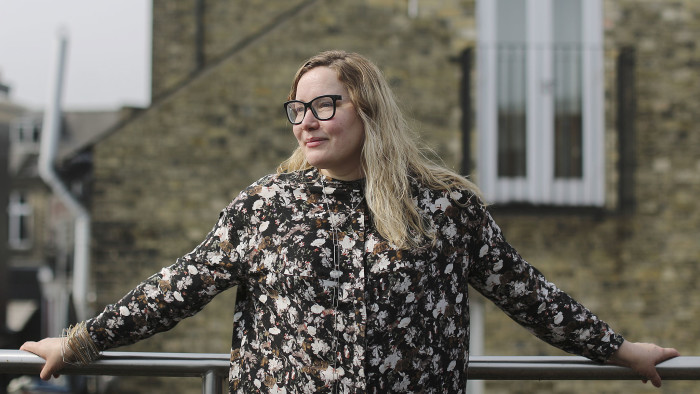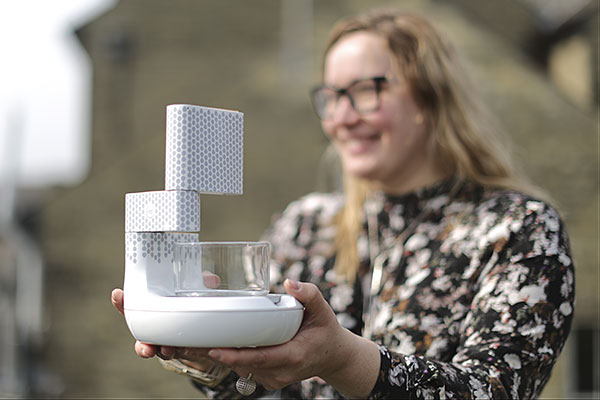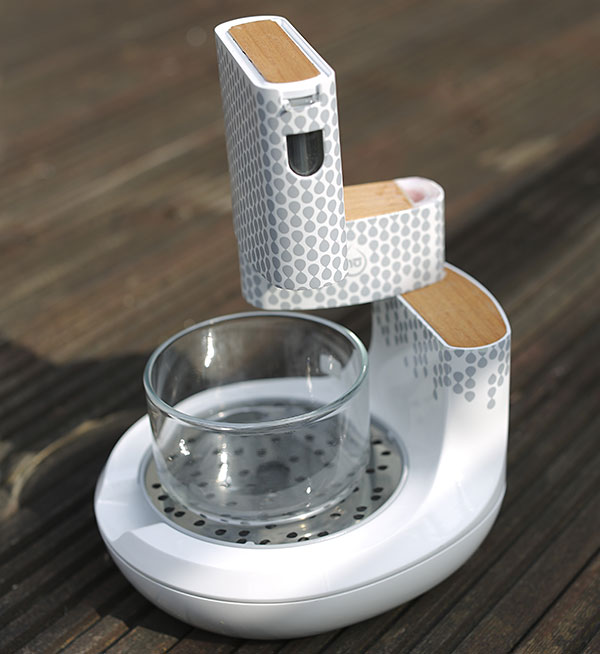Is 3D printing the shape of food to come?

Simply sign up to the Business education myFT Digest -- delivered directly to your inbox.
Pick your own strawberries might be superseded by “print your own fruit” if a former executive education student finds crowdfunding to manufacture her 3D food printer.
Vaiva Kalnikaite, who studied at Cambridge University’s Judge Business School, has set a £200,000 funding target to pay for an initial batch of 100 printers. The devices were invented by Dovetailed, the design studio she founded, to create foods from pre-packaged liquids or raw ingredients.
“You can use raw ingredients to produce strawberries with cream in the middle, although we don’t think that is as interesting as creating new shapes and tastes, like an orange made from raspberry juice,” Kalnikaite says.
Potential customers could include celebrity chefs such as Heston Blumenthal, whose reputations were built on creating offbeat dining experiences, she says. The devices might also appeal to food enthusiasts with a penchant for experimenting at home.
“They work particularly well for cocktails or sauces,” Kalnikaite says.
Dovetailed has developed the 3D printers as a sideline to its core business creating innovative technology for corporate clients. It has contracts with some 30 clients, ranging from multinational chip designer Qualcomm to small businesses and not-for-profit institutions such as Cambridge’s Fitzwilliam Museum.
Kalnikaite, a Lithuanian-born PhD graduate, started Dovetailed five years ago after internships with General Electric and Xerox as a way of marrying her interest in academia and industry.
She first moved to Cambridge to work as a user experience analyst for GE, concentrating on technology to enable power utilities to read electricity grid maps more easily. This was followed by 10 months at Cambridge-based IT company Aveva, where she worked on computer-aided design applications for PCs and mobile devices.
After completing her doctorate at Sheffield University, Kalnikaite returned to Cambridge to start Dovetailed. She says the city has proved a fertile ground for her business because of the cluster of technology companies it has nurtured, as well as the sizeable academic community. As a founder she also appreciates the quality of graduates Cambridge produces.
In addition to the 3D fruit printers, Dovetailed has helped develop virtual reality systems to aid building design and physical products including a shopping basket handle with a scanner and LED lights to warn about the sugar levels and environmental impact of foods the user is buying.
“Many companies focus on technology and hope that a great user experience will just happen,” she says. “What we do is talk to the people who will use the products or services to understand how they would interact with [them] on a day-to-day basis.”
Kalnikaite enrolled on Judge Business School’s executive education programme, the General Management Certificate of Achievement (GMCA), to improve her practical business skills.

“I found the tutors very knowledgeable about their subjects and regular contact with them gave me the opportunity to ask questions more specific to my business,” she says.
The part-time format meant she could complete five course units during the first year of trading without having to take time away from the business.
“I was able to pick topics that were most suitable for my business at that particular time,” she says, citing the teaching on negotiation, finance, people and project management as particularly helpful.
“I was able to apply most of this knowledge straight away, which I felt made me a better business owner and helped secure a few critical early stage contracts.”
Dovetailed is now an award-winning agency with six employees, including an industrial designer, an engineer, a physicist and a chemist, although Kalnikaite admits that recruitment was a skill she had to learn. The company is now growing partly through gaining repeat business from its clients.
Kalnikaite lacked skills in planning, but as a result of one of the GMCA units was able to construct a three-year strategic plan. She also says she has a better grasp of issues such as marketing because Judge brought in industry experts, whom she was able to quiz.
“I knew nothing about marketing before doing the course but I am a lot better now after being able to ask specific questions about real problems rather than just studying the theory,” she says.
“Although I had read a lot of books, magazines and things online about business, it was better to talk to people.”
The plan to develop 3D food printers is part of a wider goal for 2016 of diversifying into new products to build the client base, in particular finding customers interested in the market for wearable technology and the internet of things, Kalnikaite says.

Jargon buster: ‘pre-seed’
Scraping together enough money to start a business is hard enough. But that has not stopped the venture capital industry muddying the water further with an ever-expanding list of jargon words for the different rounds of funding appropriate for different stages of a company’s development.
The easy bit is the alphabetical ranking system. Young companies at the start-up stage raise a series A round, followed by a B when they mature into a growth business. But this categorisation was clearly too simple for sophisticated fund managers to leave at that. After B, companies must go for an “expansion” round, then maybe get some mezzanine financing.
It might have been OK if the VC industry had left it at that. The problem was that they did not. The my-round-is-bigger-than-your-round competition meant that the sums involved in series A rounds has been growing bigger and bigger over recent years. What if you wanted to raise the smaller amount that people used to think was enough to get a business off the ground not so long ago? A new piece of jargon was needed, so the industry started talking up “seed” funding rounds.
You can guess what came next. Once a seed became as big as a series A round used to be, the investment industry needed to find another name to define an investment that was a bit smaller. As a result, the “pre-seed” round was born.
Where do we go next? It is a racing certainty that the VC industry will think up an even sillier term before long. In the meantime, be wary about Googling the term “pre-seed” looking for potential backers. You are more likely to get a string of links to fertility clinics.
Comments